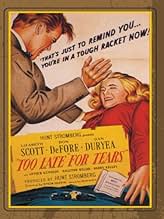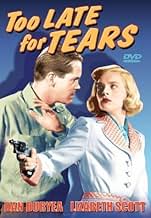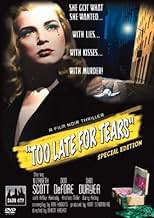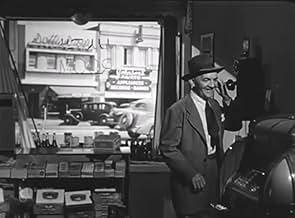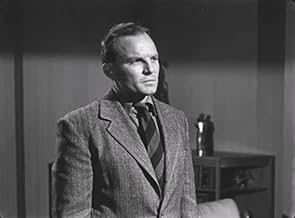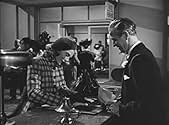IMDb-BEWERTUNG
7,3/10
6327
IHRE BEWERTUNG
Füge eine Handlung in deiner Sprache hinzuThrough a fluke circumstance, a ruthless woman stumbles across a suitcase filled with $60,000, and is determined to hold onto it even if it means murder.Through a fluke circumstance, a ruthless woman stumbles across a suitcase filled with $60,000, and is determined to hold onto it even if it means murder.Through a fluke circumstance, a ruthless woman stumbles across a suitcase filled with $60,000, and is determined to hold onto it even if it means murder.
- Auszeichnungen
- 2 wins total
Jimmy Ames
- Fat Man
- (Nicht genannt)
Georgia Backus
- Woman
- (Nicht genannt)
Robert Bice
- Policeman
- (Nicht genannt)
Paul Bradley
- Hotel Clerk
- (Nicht genannt)
John Butler
- Little Man Answering Phone
- (Nicht genannt)
David Clarke
- Jack Sharber
- (Nicht genannt)
Jimmie Dodd
- Second Car Thief
- (Nicht genannt)
Renee Donatt
- Young Lover in Boat
- (Nicht genannt)
Charles Flynn
- Policeman
- (Nicht genannt)
Billy Halop
- Boat Attendant
- (Nicht genannt)
Richard Irving
- First Car Thief
- (Nicht genannt)
Perry Ivins
- Checkroom Attendant
- (Nicht genannt)
Empfohlene Bewertungen
Came across this one by accident. A hard-to-find forgotten film of the 40's turned out to be right behind "Out Of The Past", in my opinion the best of the Noir genre. A cheapie 'B', It is Miss Scotts' picture and she is ably assisted by an 'A'cast. Dependable Arthur Kennedy plays her befuddled husband and Dan Duryea is the heavy, complete with trademark sardonic grin.
'B's don't usually get a script or a storyline of this calibre. There are several plot twists which make the film completely absorbing and make it a very swift 99 minutes.I found it in a DVD collection but if it ever shows up on TCM, do yourself a favor and try not to miss this one - it is exceptional.
'B's don't usually get a script or a storyline of this calibre. There are several plot twists which make the film completely absorbing and make it a very swift 99 minutes.I found it in a DVD collection but if it ever shows up on TCM, do yourself a favor and try not to miss this one - it is exceptional.
No need to recap the convoluted plot. The movie's a sleeper among noirs, thanks mainly to an unpredictable and well thought-out screenplay from writer Huggins. Just when you think you've got things figured, you don't. I especially like the way Huggins subtly reverses Jane's (Scott) and Danny's (Duryea) competitive relationship. Watching the two circle each other is like watching two hungry sharks. Apparently, they want to mate but don't dare get too close. Note too, how effectively director Haskin uses the stylish wide-brimmed hats to veil the identity of men entering a room. I don't recall this clever effect in any other film. This is also one of the few noirs to make the central character a woman (Jane) instead of a man.
Then too, it's a very well cast movie. Duryea is of course Duryea, a major icon of noir. On the other hand, Scott was always more a presence than an actress. Still, her presence here is used to good effect as a greedy spider woman, even if she doesn't achieve much depth. But I especially like the underrated Don DeFore. His trademark nice guy is also used to good effect in what turns out to be something more than just a nice guy. (Be sure to catch ex-Dead End kid Billy Halop as the cranky boat manager.)
I guess the only missing element from classic noir are the angular shadows of moral ambivalence. Haskin does film a number of night scenes, but I don't spot the classic lighting. Perhaps that's because his specialty as a director was science fiction and adventure films. Anyway, I'm not sure why this withering little drama hasn't achieved more recognition. Maybe it's because it was an independent production without studio backing. But whatever the reason, the movie remains a gritty little noir worth catching up with.
Then too, it's a very well cast movie. Duryea is of course Duryea, a major icon of noir. On the other hand, Scott was always more a presence than an actress. Still, her presence here is used to good effect as a greedy spider woman, even if she doesn't achieve much depth. But I especially like the underrated Don DeFore. His trademark nice guy is also used to good effect in what turns out to be something more than just a nice guy. (Be sure to catch ex-Dead End kid Billy Halop as the cranky boat manager.)
I guess the only missing element from classic noir are the angular shadows of moral ambivalence. Haskin does film a number of night scenes, but I don't spot the classic lighting. Perhaps that's because his specialty as a director was science fiction and adventure films. Anyway, I'm not sure why this withering little drama hasn't achieved more recognition. Maybe it's because it was an independent production without studio backing. But whatever the reason, the movie remains a gritty little noir worth catching up with.
Lizabeth Scott sinks her teeth into the role of a ruthless woman in "Too Late for Tears," also known as "Killer Bait," a 1949 film directed by Byron Haskin and written by a man who later became a very popular TV writer-director and creator of some top series, Roy Huggins.
The film also stars Dan Duryea, Don DeFore, and Arthur Kennedy.
Scott plays Jane Palmer, the wife of Alan Palmer (Kennedy) - while driving one night, someone from another car throws a satchel into their car. It turns out to be $60,000 (the equivalent of $598,000 today). Alan doesn't want anything to do with it, preferring to take it to the police, but Jane wants to keep it and spend it. Finally she convinces him to hide the money and wait for a time.
Jane, it turns out, is one tough cookie, and without giving much away, let's say that getting her hands on that money becomes her full time job, and she's determined that nothing and no one will stand in her way. Unfortunately for a few people, they stood in her way.
Really terrific noir set in Hollywood, with Dan Duryea playing a sleaze, but actually less of a sleaze than Jane - he's more of an opportunist than evil; Don Defore is friendly and unassuming as a friend of Alan Palmer's, and Arthur Kennedy, one of the finest actors in film, is just plain wasted. Perhaps this was a film he had to do in order to fulfill a contract, or it was a loanout on trade - it was a waste.
It's Scott's film, and with her husky voice, lovely smile and pouty lips, she's able to, at first anyway, hide a core of steel underneath.
Very good. If you're a fan of film noir, see this one.
The film also stars Dan Duryea, Don DeFore, and Arthur Kennedy.
Scott plays Jane Palmer, the wife of Alan Palmer (Kennedy) - while driving one night, someone from another car throws a satchel into their car. It turns out to be $60,000 (the equivalent of $598,000 today). Alan doesn't want anything to do with it, preferring to take it to the police, but Jane wants to keep it and spend it. Finally she convinces him to hide the money and wait for a time.
Jane, it turns out, is one tough cookie, and without giving much away, let's say that getting her hands on that money becomes her full time job, and she's determined that nothing and no one will stand in her way. Unfortunately for a few people, they stood in her way.
Really terrific noir set in Hollywood, with Dan Duryea playing a sleaze, but actually less of a sleaze than Jane - he's more of an opportunist than evil; Don Defore is friendly and unassuming as a friend of Alan Palmer's, and Arthur Kennedy, one of the finest actors in film, is just plain wasted. Perhaps this was a film he had to do in order to fulfill a contract, or it was a loanout on trade - it was a waste.
It's Scott's film, and with her husky voice, lovely smile and pouty lips, she's able to, at first anyway, hide a core of steel underneath.
Very good. If you're a fan of film noir, see this one.
This is a solid and sometimes memorable crime drama, filled with tension, and featuring some pretty good performances from the cast. The noir atmosphere works well, and the story, while perhaps far-fetched at a couple of points, is quite involved and grabs your attention from the beginning.
Lizabeth Scott gets one of her best roles, as a hard-hearted woman who seizes her opportunity to play the male characters against each other so that she can get what she wants. Scott is slightly lacking in the glamour that would make her a really memorable femme fatale, but she has plenty of strength, and her voice works well for the character. Dan Duryea gives one of his many fine noir performances, taking good advantage of his many opportunities with his shady character. Arthur Kennedy and Kristine Miller are both sympathetic as the more innocent of the main characters. Don DeFore's character sometimes seems a little out of place, but he is often crucial in advancing the plot.
The story starts with an unlikely coincidence, with a bag of money that gets tossed into the wrong car. But from there, most of the story developments follow naturally, and the tension is built up rather well as things get more complicated. It's an entertaining movie that has most of the things that fans of film-noir and crime drama would want to see.
Lizabeth Scott gets one of her best roles, as a hard-hearted woman who seizes her opportunity to play the male characters against each other so that she can get what she wants. Scott is slightly lacking in the glamour that would make her a really memorable femme fatale, but she has plenty of strength, and her voice works well for the character. Dan Duryea gives one of his many fine noir performances, taking good advantage of his many opportunities with his shady character. Arthur Kennedy and Kristine Miller are both sympathetic as the more innocent of the main characters. Don DeFore's character sometimes seems a little out of place, but he is often crucial in advancing the plot.
The story starts with an unlikely coincidence, with a bag of money that gets tossed into the wrong car. But from there, most of the story developments follow naturally, and the tension is built up rather well as things get more complicated. It's an entertaining movie that has most of the things that fans of film-noir and crime drama would want to see.
Lizabeth Scott did her best remembered work in film noir (more than half of her only 21 screen credits fall within the noir cycle), and became one of its iconic faces. Rarely, however, was she called upon to play the fully-fledged femme fatale, and there's probably a reason for this: She couldn't bring off duplicity.
Her smile had no shadings into wry, or ironic, or smirky; it had but one setting a fresh, guileless grin that lit up like a Christmas tree. F. Scott Fitzgerald (in his sad screenwriting days) observed of Joan Crawford that you couldn't give her a simple stage direction like `telling a lie' because then she'd give an impersonation of Benedict Arnold betraying West Point to the British. But Scott can't manage even that, which results in confusingly mixed signals when her characters are motivated by malice, like Coral Chandler in Dead Reckoning: Her smile keeps convincing us that she's on the up-and-up.
Her damn smile keeps switching on in Too Late For Tears, even though there's no doubt that she's one hard, cold case. She and husband Arthur Kennedy are bickering one night en route to a party in the Hollywood Hills when suddenly a suitcase crammed with cash lands in their roadster. He wants to turn it over to the police, but she persuades him to think it over, so they check the valise at Union Station. When she starts buying clothes and furs against the checked capital, it's clear she has no intention of surrendering the windfall; we learn that her background was `white-collar poor, middle-class poor,' and that she'd made a previous marriage solely for money.
Strange men start ringing her doorbell. First Dan Duryea shows up, a blackmailer for whom the payoff was intended. He slaps her around playfully (`What do they call you besides stupid,' she taunts him. `Stupid will do if you don't bruise easily,' he purrs back). Quickly Scott maneuvers Duryea into helping him murder Kennedy but still won't tell him where the money's stashed. Though wary, he falls for her, starts hitting the bottle, and grows careless. Meanwhile, Kennedy's sister (Kristine Miller) harbors suspicions about his mysterious disappearance. When the next caller (Don DeFore) shows up, claiming to be an old Air Corps buddy of Kennedy's, she makes an alliance with him to find out what's really going on. And the claim ticket for the money keeps changing hands....
The plot is none too simple, and in consequence director Byron Haskin spends a lot of time trying to keep it clear rather than addressing some questions about character and logic that inevitably arise. Why did the avaricious, manipulative Scott marry Kennedy in the first (or second) place? Why does the sister live so conveniently close? How did Duryea, and for that matter DeFore, find Scott so easily? But few thriller plots are so tightly constructed that they survive rigorous analysis. Too Late For Tears passes muster as hard-boiled, late-40s noir and as one of Scott's hardest, strongest performances, inappropriate smile and all.
Her smile had no shadings into wry, or ironic, or smirky; it had but one setting a fresh, guileless grin that lit up like a Christmas tree. F. Scott Fitzgerald (in his sad screenwriting days) observed of Joan Crawford that you couldn't give her a simple stage direction like `telling a lie' because then she'd give an impersonation of Benedict Arnold betraying West Point to the British. But Scott can't manage even that, which results in confusingly mixed signals when her characters are motivated by malice, like Coral Chandler in Dead Reckoning: Her smile keeps convincing us that she's on the up-and-up.
Her damn smile keeps switching on in Too Late For Tears, even though there's no doubt that she's one hard, cold case. She and husband Arthur Kennedy are bickering one night en route to a party in the Hollywood Hills when suddenly a suitcase crammed with cash lands in their roadster. He wants to turn it over to the police, but she persuades him to think it over, so they check the valise at Union Station. When she starts buying clothes and furs against the checked capital, it's clear she has no intention of surrendering the windfall; we learn that her background was `white-collar poor, middle-class poor,' and that she'd made a previous marriage solely for money.
Strange men start ringing her doorbell. First Dan Duryea shows up, a blackmailer for whom the payoff was intended. He slaps her around playfully (`What do they call you besides stupid,' she taunts him. `Stupid will do if you don't bruise easily,' he purrs back). Quickly Scott maneuvers Duryea into helping him murder Kennedy but still won't tell him where the money's stashed. Though wary, he falls for her, starts hitting the bottle, and grows careless. Meanwhile, Kennedy's sister (Kristine Miller) harbors suspicions about his mysterious disappearance. When the next caller (Don DeFore) shows up, claiming to be an old Air Corps buddy of Kennedy's, she makes an alliance with him to find out what's really going on. And the claim ticket for the money keeps changing hands....
The plot is none too simple, and in consequence director Byron Haskin spends a lot of time trying to keep it clear rather than addressing some questions about character and logic that inevitably arise. Why did the avaricious, manipulative Scott marry Kennedy in the first (or second) place? Why does the sister live so conveniently close? How did Duryea, and for that matter DeFore, find Scott so easily? But few thriller plots are so tightly constructed that they survive rigorous analysis. Too Late For Tears passes muster as hard-boiled, late-40s noir and as one of Scott's hardest, strongest performances, inappropriate smile and all.
Wusstest du schon
- WissenswertesThe UCLA Film and Television Archive has remastered Der blonde Tiger (1949) from a recently discovered original print. The restoration process took five years after the print was discovered in France, and involved piecing segments of another copy into the restored version to have a complete film. The restoration was funded by the Film Noir Foundation. The restored version was broadcast on 7/17/2015, on the Turner Classic Movies network in pristine condition. The restored version of the film was released in 2016 on Blu-ray in the United States and the United Kingdom. The film has developed a cult following in the years since its release.
- PatzerJane tells Alan that the $790 she has spent represents about one tenth of a percent of the money in the satchel. Since they thought they had $100,000 (later determined by Danny the blackmailer to be $60,000). One tenth of a percent of 100,000 would be $100, so she spent closer to eight tenths of a percent of what she thought they had. A tenth of a percent of $60,000 would be $60, and $790 would be slightly over 1.3 per cent of that amount.
- Zitate
Danny Fuller: Don't ever change, Tiger. I don't think I'd like you with a heart.
- VerbindungenEdited into Your Afternoon Movie: Too Late for Tears (2022)
Top-Auswahl
Melde dich zum Bewerten an und greife auf die Watchlist für personalisierte Empfehlungen zu.
- How long is Too Late for Tears?Powered by Alexa
Details
- Laufzeit
- 1 Std. 39 Min.(99 min)
- Farbe
- Seitenverhältnis
- 1.37 : 1
Zu dieser Seite beitragen
Bearbeitung vorschlagen oder fehlenden Inhalt hinzufügen


